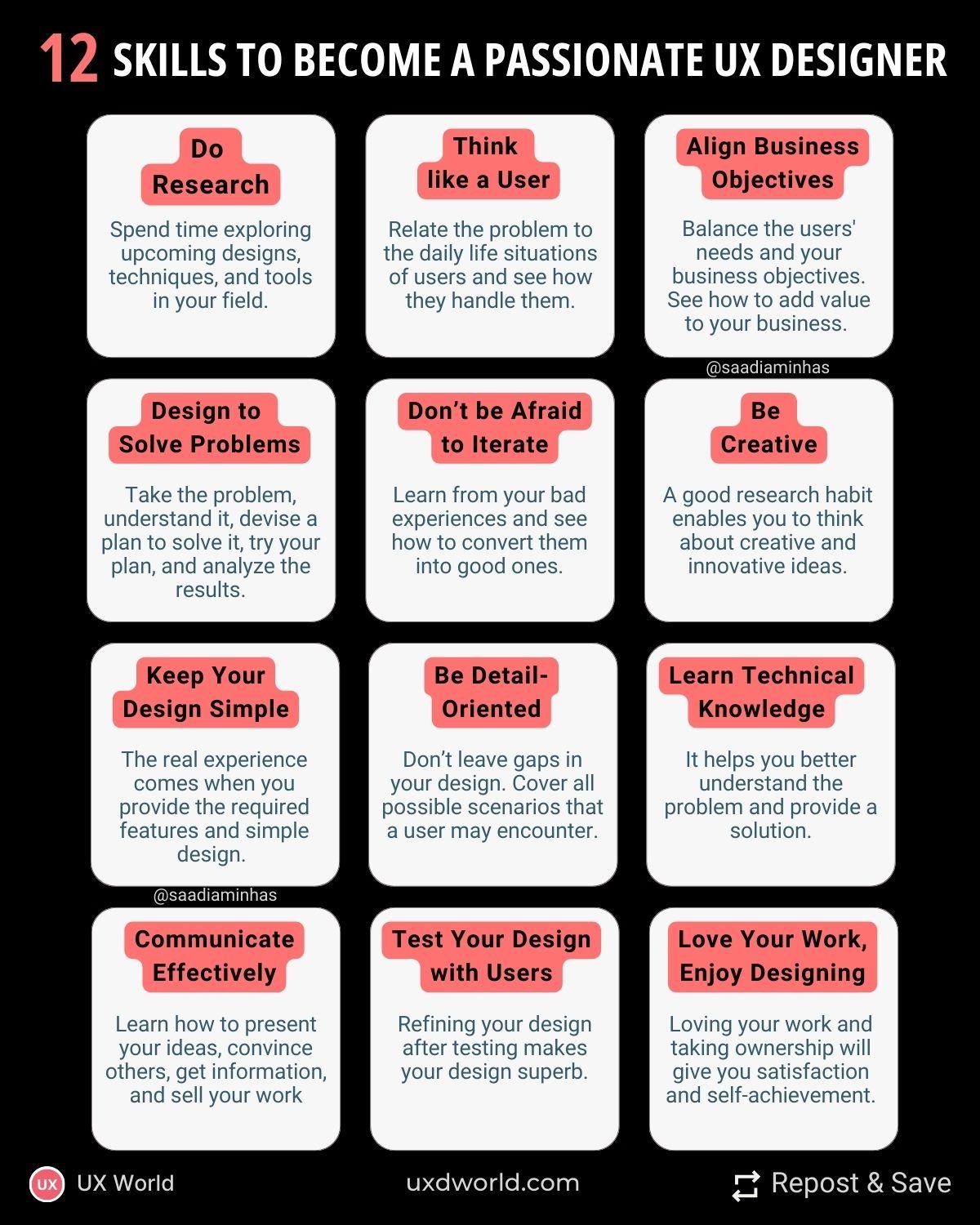Last Updated on January 22, 2025 by UX World
A user experience (UX) designer defines how a user feels while interacting with a product.
Below is a set of skills that make you a passionate UX designer. These skills are simple to learn and adopt in your design process.
- Do Research
- Think as if you are a user, not a designer
- Keep business objectives in mind
- Design to solve problems
- Don’t be afraid to iterate
- Be creative
- Keep your design simple
- Be detail-oriented
- Learn technical knowledge
- Communicate ideas effectively
- Test your designs with users
- Love your work, enjoy designing

Grow your UX career using this UX Career Study Guide.
№1. Do Research
A must skill for UX designers is to do research, and do it all the time. Make yourself up to date with the latest trends. Spend maximum time exploring upcoming designs, techniques, and tools in your field. Always compare the knowledge you attain each day and see how quickly things evolve.
It gives you an amazing feeling when this exploration clicks into your mind while designing your UI.
№2. Think as If You are a User, Not a UX Designer
It is important to satisfy your users — the personas that use your product.
Never try to impose your likes and dislikes on your design. You are not designing for yourself.
Always involve your users in your process and get their feedback to create the best solution. Extensive observation of your users while working on a project is essential to becoming a passionate UX designer. Meet them, talk to them, and see their working environment.
Relate the problem to the daily life situations of your users and see how they handle them.
This will help you discover their needs and how they want to fulfill them. Collect your findings and think of the design you want to build for them.
Believe me, this makes a lot of difference!
№3. Keep Business Objectives in Mind
Of course, you need to keep a balance between the users’ wishlist and your business objectives. See how your work is putting value into your business. Is the effort you put into building your design worth what it costs? Always answer these questions before moving forward with your client.
Passionate UX designers do not focus on designing only, they need to align their designs with users and business needs.
Analyze the requirements keeping in view your business needs.
№4. Design to Solve Problems
Design always solves a well-defined problem.
To solve a design problem,
- Take the problem of your user
- Make a clear understanding of it
- Devise a plan to solve it
- Try your plan and analyze the results
If you are satisfied with your outcomes, get feedback from your users. Repeat this process until you can build a masterpiece that satisfies your user and is worth what it costs.
Always try to be clear in your thoughts.
№5. Don’t be Afraid to Iterate
Each time you iterate your design, you will learn a hundred new things. Without iterations, you can never become a good designer. If UX is your passion, these iterations will help you learn a lot.
The key to success is to list the ‘DONT’S’ of each iteration and not repeat them. Note the things that you like in each iteration and DO them again.
If you are not liking your work, no worries. Give it another try with a new passion and use your past experiences.
No work is ever wasted.
Learn from your bad experiences and see how to convert them into good ones.
A wrong try at the beginning can move you to a brilliant idea at a later stage.
№6. Be Creative
A good research habit enables you to think about new and innovative ideas. Becoming a passionate UX designer, you would love to try new things and be more creative.
Always feel the courage to try new and different things in your design, while following the standards at the same time.
Note down the ideas as they come up to your mind. Do brainstorm your ideas with the people around you.
№7. Keep Your Design Simple
Focus on important and required features. Forget about extra things that seem essential to you but do not add value for your customer. These additional features make your design complex.
Remember, it is easy to make things complicated.
The real experience comes when you provide the required features while keeping your design simple.
№8. Be Detail Oriented
Don’t leave gaps in your design.
Cover all possible scenarios that a user may encounter.
A design can best be evaluated with small interactions and responses when an error occurs or something gets stuck.
Give equal importance to small details. Your extensive observation skill helps you do that.
№9. Don’t Just be a Designer, Learn Technical Knowledge
It is always good not to limit yourself to designing without any technical background. You can better understand the problem and provide a solution if you have some technical knowledge of the system you are working on.
It makes you independent enough if you know how your design will work in the development environment, how a coder will implement it, and what are the technical constraints.
№10. Communicate Your Ideas Effectively
A powerful communication skill helps you like anything in your design process.
You have to be good at
- how to present your ideas,
- how to convince people,
- how to get information from them, and
- how to market your work.
This skill has a very positive impact on your work.
№11. Test Your Design with Users
You cannot become a good UX designer while working alone. You will need continuous involvement of people around you. You can ask your colleagues to do this favor. Real user experience can only be achieved by testing your design with real users.
Refining your design after testing is the actual thing that makes your design superb.
The discussion always opens new windows of thought.
№12. Love your Work, Enjoy Designing
… And most importantly,
- love to design things️,
- l️ove to meet people,
- love to iterate️,
- ️ ️love to improve continuously, and
- ️ love to move on ️…
Loving the work you do, and taking its ownership will give you enormous inner satisfaction and self-achievement!! ❤️
Grow your UX career using this UX Career Study Guide.
Want to Learn UX Design?
- Try Interaction Design Foundation. IxDF offers online design courses covering the entire UX design spectrum, from foundational to advanced level. As a UX Design World reader, you get 25% off your first year of membership with the IxDF.
- The UI/UX Design Specialization from Coursera brings a design-centric approach to user interface anduser experience design and offers practical, skill-based instruction centered around a visual communications perspective. By learning this Design Specialization, you can design high-impact user experiences for your customers.
Thanks for reading.
Subscribe to more related articles on UX World.
If you have any questions, contact us here: Facebook | YouTube | Instagram | Linkedin



